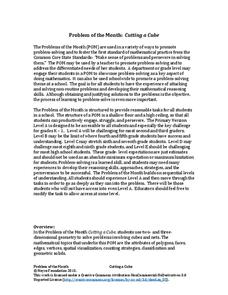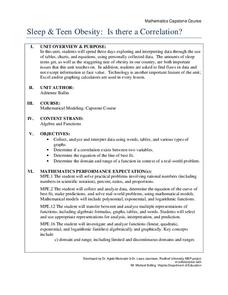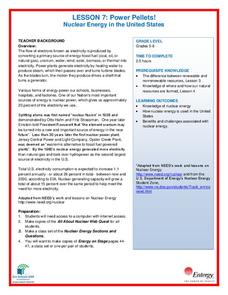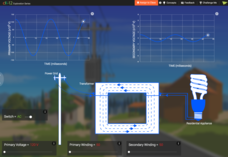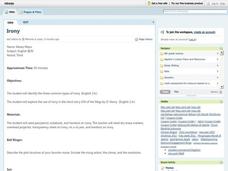Alabama Department of Archives and History
Alabama's 1901 Constitution
"We, the People of the State of Alabama. . ." Did you know that the Alabama State Constitution has 357,157 words while the US Constitution has only 4,400? And that it has 798 amendments while the US Constitution has...
Houghton Mifflin Harcourt
Silly Stories: Challenge Activities (Theme 1)
This packet, the first in the series of support materials for the Houghton Mifflin Harcourt thematic units on silly stories, contains enrichment activities for learners who have mastered the basic concepts of the lessons.
University of Hawaiʻi
Taxonomy and Me!
Taxonomy is the study of organisms and how you phylum. Three biology activities are included, helping scholars understand four of the six kingdoms, specifically Protista, Plantae, Fungi, and Animalia. Scholars observe and classify...
EngageNY
Advanced Factoring Strategies for Quadratic Expressions (part 1)
Factoring doesn't have to be intimidating. Build on prior knowledge of multiplying binomials and factoring simple trinomials to teach advanced factoring of quadratic expressions with a instructional activity that uses various methods of...
Noyce Foundation
Cutting a Cube
Teach the ins and outs of the cube! A series of five K–12 level activities explore the make-up of the cube. The beginning lessons focus on the vocabulary related to the cube. Later lessons explore the possible nets that describe a cube....
Institute of Electrical and Electronics Engineers
Can You Copperplate?
Introduce emerging engineers to the process of metal plating. This resource provides background reading on chemical engineering, plating, and corrosion. It concludes with a copper plating activity. The standards alignment list includes...
Radford University
Sleep and Teen Obesity: Is there a Correlation?
Does the number of calories you eat affect the total time you sleep? Young mathematicians tackle this question by collecting their own data and making comparisons between others in the class through building scatter plots and regression...
National Wildlife Federation
Power Pellets! Nuclear Energy in the United States
Nuclear power provides about 20 percent of the energy generated in the United States. The seventh activity in the series of 12 tackles nuclear power. After sharing what they know about nuclear energy, scholars complete a...
Science Matters
Fault Formations
The San Andreas Fault moves about two inches a year, approximately the same rate fingernails grow—crazy! The third lesson in the series allows for hands-on exploration of various fault formations. Through the use of a Popsicle stick,...
Pacific University Oregon
Civil Rights: US History
To gain an understanding of the Civil Rights Movement of the 1960s, class members investigate the Jim Crow Laws, the Emancipation Proclamation, the 13th, 14th, and 15th Amendments of the US Constitution, and the 1898 Supreme Court case,...
CK-12 Foundation
See Saw
Can a mother who weighs five times more than her child really be held in the air on a see saw by the child? A simple simulation demonstrates how this is possible through altering the distance from the fulcrum. Scholars can adjust the...
CK-12 Foundation
Irwin and Ruthie
Learners compare acceleration to displacement through an interactive tutorial that permits them to adjust the running strategy of two robots and watch them race. A graph displays the robot's velocity over time and another shows their...
CK-12 Foundation
Touch Screen
Touch screens are becoming more common, but how do they work? The simulation shows the electric potential versus system charge as scholars alter three variables. The schematic of the capacitance demonstrates the set up as each variable...
CK-12 Foundation
AC Transformer
High voltage power lines deliver electricity to homes, but each home requires low voltage. How does the energy get converted so it can be used safely? Pupils explore alternating current and transformers through a simulation. They control...
New Brunswick Department of Education
Personal Development And Career Planning Curriculum Grade 9/10
What is the difference between a proactive person and a reactive person? Scholars explore the topic, and many others, with helpful lessons, discussions, role play activities, and games. Each activity supports one of the key principles...
Curated OER
The Tell-Tale Heart
Bring Edgar Allan Poe's spooky story to life! After reading the short story "The Tell-Tale Heart," middle and high schoolers identify the theme, character traits, irony, and other story concepts. During pre-reading, they take notes,...
Curated OER
A Cone and Its Net
Create and investigate nets for solid shapes with your class. They identify the different parts and faces of each polygon and solid then calculate the surface area and volume of cones. They use circle sectors of varying sizes to build...
EngageNY
Completing the Square (part 2)
Give classes confidence in completing the square with a resource that develops the process of completing the square of more complex problems, including fractions and values greater than one. It then uses quadratic modeling for...
Curated OER
Guided Reading Organizer for Chain Reaction
The class uses Chain Reaction, a magazine, to build a better understanding of Latin and Greek roots found in scientific vocabulary. They use two attached worksheets to help them read a scientific article, using visual clues and their...
Curated OER
Connotation: "My Papa's Waltz" by Theodore Roethke
What's happening in this poem? Have your high schoolers participate in an activity about connotation and denotation. They apply the concept of connotation to a reading of Theodore Roethke's poem "My Papa's Waltz." Lead a discussion about...
Curated OER
Parts of Speech
This online multiple choice quiz focuses on upper-level grammar concepts. In addition to covering simple parts of speech such as nouns, verbs, and adjectives, this resource also covers more advanced information, such as transitive vs....
Curated OER
Irony
What are the three types of irony? High schoolers engage in a lesson about the use of irony while reading O.Henry's short story "Gift of the Magi." They'll discuss rising action, climax, and resolution in the text before highlighting the...
Curated OER
Square Corners
What type of corners does this shape have? Young geometers examine 12 shapes, circling the square corners in each if they have any. There are two examples demonstrating this concept, but be sure scholars understand the difference between...
Curated OER
Early Mental Math: Practice
Pupils start from a given number and count forward by 1s, 2s, and 10s. They "make ten" in 4 addition problems, and add or subtract 2 in the rest. Finally, they circle the odd numbers in a list from 1-14.




